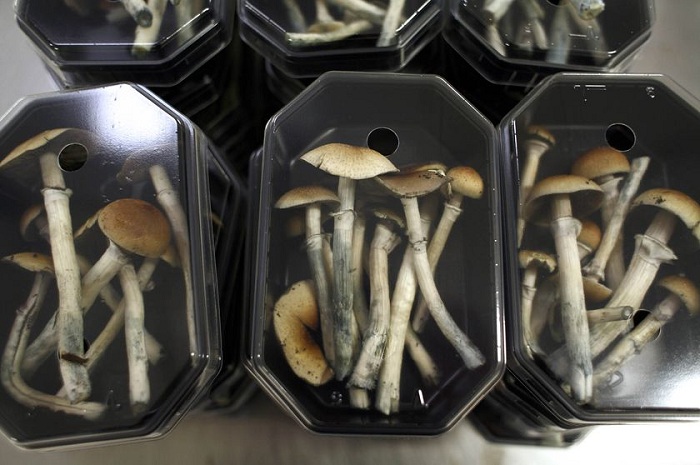Psychedelic mushrooms relieve cancer patients` anguish

For some patients with advanced cancer, the shock of illness and the accompanying end-of-life dread can lead to hopelessness, demoralization, even suicide. As many as 40 percent of such patients experience anxiety or depression, and antidepressants work only about as well as placebo treatments.
The new studies themselves are dramatic enough, but the Journal of Psychopharmacology reinforces their findings by filling the rest of its issue with expert commentaries exploring everything from the biochemistry of how psilocybin works, to the U.S. drug laws that halted psychiatric research, to confronting the millennia-old conundrum of what Søren Kierkegaard called "the sickness unto death."
One study, led by New York University researchers, split its 29 subjects with advanced cancer into two groups; both went through psychotherapy as part of the experiment. One group was given a dose of 0.3 milligrams of laboratory-produced psilocybin per kilogram of body weight, while the other was given a control treatment of the vitamin niacin. Seven weeks later, each group was given the opposite substance.
The results, the authors write, were "rapid, robust, and sustained": Single doses eased depression and anxiety for longer than seven weeks and up to eight months. The authors conclude, with a remarkable assessment of their results, that "this pharmacological finding is novel in psychiatry."
The second study, led by doctors at Johns Hopkins University School of Medicine, divided into two groups 51 patients with life-threatening cancer diagnoses. They were given either a therapeutic or a very low dose of psilocybin in a first treatment, then got the opposite dose five weeks later.
Like the NYU study, the Johns Hopkins results "show that psilocybin produced large and significant decreases" in depression, anxiety, or moodiness, "and increases in measures of quality of life, life meaning, death acceptance, and optimism," its authors write. "These effects were sustained at six months."
Roland Griffiths, a professor of psychiatry and behavioral sciences at Johns Hopkins and lead author of the study, underscored the apparently unique effects of the experimental treatment at a press conference Wednesday.
"The finding that a single administration of a relatively short-acting drug has rapid substantial and enduring anti-depressant and anti-anxiety effects is really unprecedented," he said, "and really may represent a potential paradigm shift for treating patients suffering with cancer-related psychological distress."
The studies come two days after the U.S. Food and Drug Administration approved testing of the illegal drug MDMA—also known as ecstasy or molly—to treat post-traumatic stress disorder, as medical research begins cautiously investigating potential therapeutic uses of consciousness-altering drugs.
In the 1950s and 1960s, early medical research found drugs like MDMA, psilocybin, and LSD held some therapeutic promise—even if those studies lacked today`s best practices for experimental controls, disclosures, and clinical trials. The passage of new drug laws in the early 1970s brought that work to a halt, and today, researchers must manage legal, ethical, and cultural hurdles to re-opening studies of these potent substances. Psilocybin and MDMA are both classified by the Drug Enforcement Administration as Schedule I drugs, meaning they have "no currently accepted medical use and a high potential for abuse."
The consequences of safely bringing any of those substances into medical treatment could be interesting.
In a commentary accompanying the studies, Craig Blinderman, the director of palliative care at Columbia University Medical Center/New York-Presbyterian Hospital, notes that several states now have assisted-suicide laws that let patients end their own pain. But what if psilocybin could not only alleviate mental anguish but even give life meaning, for many months, with one dose? After all, Blinderman writes, throughout history spiritual healers have used hallucinogenic compounds that generate a feeling of the divine.
At Wednesday`s press conference, patients and their family members testified to the powerful subjective experiences they had experienced in their experimental treatment. Lisa Callaghan of Brooklyn read part of a journal entry from her late husband Patrick Mettes, who participated in one of the studies. He likened his experience in treatment to launching in a space shuttle, rising until he felt "the weightlessness and majesty of space."
Dinah Bazer, also of Brooklyn, said her treatment had rid her of the mental anguish she suffered following her cancer diagnosis several years ago.
"As an atheist, it`s hard for me to say this, but I was bathed in God`s love," she said. "And that continued for hours. When the experience was over, the fear and anxiety was still gone, and my life was changed."















































